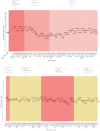Intervening on Global Emergencies: The Value of Human Interactions for People's Health
- PMID: 37754013
- PMCID: PMC10525546
- DOI: 10.3390/bs13090735
Intervening on Global Emergencies: The Value of Human Interactions for People's Health
Abstract
Literature about global emergencies and their impact on people's health underlines the need to improve the social cohesion of human community and the availability of tools to support people and foster community interactions. This paper illustrates research aimed at describing and measuring human interactions in the Veneto community and its changing during the COVID-19 pandemic. 50,000 text occurrences from social media and newspapers about these topics were analyzed between December 2021 and January 2022. People present themselves as members of different teams, pursuing conflicting aims, and attributing the decision-making responsibility of emergencies management exclusively to governments, without considering themselves as active parts of the community. This delegation process on citizens' behalf can affect their health: by taking minor responsibility in handling the repercussions of these events on the community and by arguing over the most effective way to deal with them, they risk freezing and waiting for action by third parties, thus leaving mutual interactions and the promotion of their own health at a standstill. Local institutions can use these data to shape prevention policies to manage the community's emergencies and use them as opportunities to promote public health.
Keywords: COVID-19; emergency; health; social cohesion; text analysis.
Conflict of interest statement
The authors declare no conflict of interest.
Figures
Similar articles
-
Responsibility-sharing for pets in disasters: lessons for One Health promotion arising from disaster management challenges.Health Promot Int. 2022 Feb 17;37(1):daab078. doi: 10.1093/heapro/daab078. Health Promot Int. 2022. PMID: 34125172
-
Citizens' Adherence to COVID-19 Mitigation Recommendations by the Government: A 3-Country Comparative Evaluation Using Web-Based Cross-Sectional Survey Data.J Med Internet Res. 2020 Aug 11;22(8):e20634. doi: 10.2196/20634. J Med Internet Res. 2020. PMID: 32716896 Free PMC article.
-
Effects of the COVID-19 Emergency and National Lockdown on Italian Citizens' Economic Concerns, Government Trust, and Health Engagement: Evidence From a Two-Wave Panel Study.Milbank Q. 2021 Jun;99(2):369-392. doi: 10.1111/1468-0009.12506. Epub 2021 Apr 6. Milbank Q. 2021. PMID: 33822424 Free PMC article.
-
Changing a Community: A Holistic View of the Fundamental Human Needs and Their Public Health Impacts.Cureus. 2023 Aug 24;15(8):e44023. doi: 10.7759/cureus.44023. eCollection 2023 Aug. Cureus. 2023. PMID: 37638264 Free PMC article. Review.
-
People's policies for the health of the poor globally.Int J Health Plann Manage. 2012 Apr-Jun;27(2):e92-103. doi: 10.1002/hpm.1087. Epub 2011 Jun 15. Int J Health Plann Manage. 2012. PMID: 21674620 Review.
Cited by
-
The Invisible Discrimination: Biases in the Clinical Approach Regarding Migrants: A Study to Help Ethnopsychology Services and Clinicians.Behav Sci (Basel). 2024 Feb 21;14(3):155. doi: 10.3390/bs14030155. Behav Sci (Basel). 2024. PMID: 38540458 Free PMC article. Review.
-
Social Cohesion and COVID-19: Integrative Review.Interact J Med Res. 2024 Nov 21;13:e51214. doi: 10.2196/51214. Interact J Med Res. 2024. PMID: 39571166 Free PMC article. Review.
-
Worry about the Future in the Climate Change Emergency: A Mediation Analysis of the Role of Eco-Anxiety and Emotion Regulation.Behav Sci (Basel). 2024 Mar 21;14(3):255. doi: 10.3390/bs14030255. Behav Sci (Basel). 2024. PMID: 38540558 Free PMC article.
-
Psychological impact of climate change emergency: an attempt to define eco-anxiety.Front Psychol. 2024 Sep 17;15:1375803. doi: 10.3389/fpsyg.2024.1375803. eCollection 2024. Front Psychol. 2024. PMID: 39355285 Free PMC article. No abstract available.
-
Pupils' inclusion as a process of narrative interactions: tackling ADHD typification through MADIT methodology.BMC Psychol. 2024 May 21;12(1):281. doi: 10.1186/s40359-024-01767-w. BMC Psychol. 2024. PMID: 38773668 Free PMC article.
References
-
- Haghani M., Kuligowski E., Rajabifard A., Lentini P. Fifty years of scholarly research on terrorism: Intellectual progression, structural composition, trends and knowledge gaps of the field. Int. J. Disaster Risk Reduct. 2022;68:102714. doi: 10.1016/j.ijdrr.2021.102714. - DOI
-
- McCann W.S. Outbreak: A Comprehensive Analysis of Biological Terrorism. Stud. Confl. Terror. 2022:1–30. doi: 10.1080/1057610X.2022.2034852. - DOI
-
- Huang D., Wang S., Liu Z. A systematic review of prediction methods for emergency management. Int. J. Disaster Risk Reduct. 2021;62:102412. doi: 10.1016/j.ijdrr.2021.102412. - DOI
-
- Raikes J., McBean G. Responsibility and liability in emergency management to natural disasters: A Canadian example. J. Disaster Risk Reduct. 2016;16:12–18. doi: 10.1016/j.ijdrr.2016.01.004. - DOI
LinkOut - more resources
Full Text Sources



